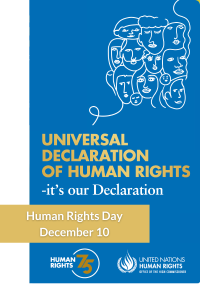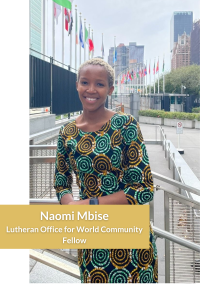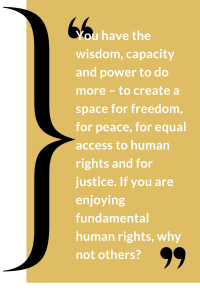by Naomi Mbise, Lutheran Office for World Community Fellow
 As we navigate through 2023, our world is experiencing human rights violations at an alarming rate. These serve as a stark reminder of the challenges we face in multilateralism. To adapt and protect fundamental freedoms and rights in a rapidly changing world, agility and commitment are needed.
As we navigate through 2023, our world is experiencing human rights violations at an alarming rate. These serve as a stark reminder of the challenges we face in multilateralism. To adapt and protect fundamental freedoms and rights in a rapidly changing world, agility and commitment are needed.
Human Rights Day is 10 December. It marks adoption in 1948 of the Universal Declaration of Human Rights (UDHR), commemorating in 2023 its 75th anniversary (HR 75). The UDHR has laid the foundation for protecting human rights.
As we reflect on the past and celebrate achievements, let us also acknowledge the work that lies ahead. Embracing agility in human rights requires collective determination. Principles of human rights must not just be ideals but living realities.
In my work at the Lutheran Office for World Community, I am called to advocate for the rights of the most vulnerable. Showing up in spaces where policies of tangible support are created. I often find myself at the intersection of international affairs, grassroot and faith-based networks: working towards the practical realization of human rights within the context of our faith-based and humanity principles.
Courageous Faithful Action
 We must not become indifferent to the persistent human rights violations around the globe. The ELCA social message “Human Rights” states, “Too often, we, as members of this society, are buried under the concerns of everyday life. The human rights abuses of people we don’t know or understand are too remote to stir us to action” (p. 8).
We must not become indifferent to the persistent human rights violations around the globe. The ELCA social message “Human Rights” states, “Too often, we, as members of this society, are buried under the concerns of everyday life. The human rights abuses of people we don’t know or understand are too remote to stir us to action” (p. 8).
As a communion of churches and as people of faith we are called to engage. “The Lutheran World Federation (LWF) views engagement in the search for social and economic justice and the promotion of human dignity as fundamental elements of a holistic Christian ministry and witness,” affirms LWF’s “Faith and Human Rights: Voices from the Lutheran Communion” (p. 9).
In another noteworthy milestone, the Lutheran World Federation (LWF) celebrates a decade since the adoption of our Gender Justice Policy in 2013. This marks a significant step forward in promoting equality and inclusivity. The LWF’s commitment to gender justice serves as a beacon for the positive impact that intentional policies can have on the realization of human rights.
Intentional Commitment
 The protection of human rights requires intentionality. As guardians of human rights, we must be nimble in our approach, ensuring that our efforts remain aligned with the needs of the ever-changing global community. I find encouragement from author and podcaster Brené Brown, who has emphasized: We need courageous cultures. Brown says: you and I must create and hold spaces that rise to higher standards of behavior than what we experience in the news, on TV and in the streets. I think courageous cultures prioritize protection of human rights.
The protection of human rights requires intentionality. As guardians of human rights, we must be nimble in our approach, ensuring that our efforts remain aligned with the needs of the ever-changing global community. I find encouragement from author and podcaster Brené Brown, who has emphasized: We need courageous cultures. Brown says: you and I must create and hold spaces that rise to higher standards of behavior than what we experience in the news, on TV and in the streets. I think courageous cultures prioritize protection of human rights.
If you feel despair in trying to make a difference, I have some words of encouragement for you.
You can do more. Yes, you can do more because that’s humanity. You have the wisdom, capacity and power to do more – to create a space for freedom, for peace, for equal access to human rights and for justice. If you are enjoying fundamental human rights, why not others?
The call to action for human rights is clear: we can do better to rise above the challenges and foster an environment where justice, freedom and equality prevail. It is not merely a task; it is a testament to our shared commitment to a better world.
